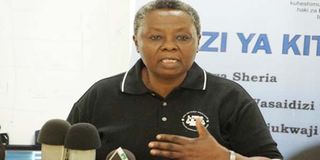Chaos threat looms ahead of 2015 General Election

The executive director of the Legal and Human Rights Centre, Ms Hellen Kijo-Bisimba, Who describes the violent wrangles as gross abuse of human rights and warns that the country will see more of them if measures to curb them are not timely taken. PHOTO|FILE
What you need to know:
- Analysts and politicians have warned that if the trend is not timely checked, it could greatly undermine the polls, sow seeds of instability, tarnish Tanzania’s good record of political tolerance and cordial politicking.
Dar es Salaam. With about a year to go before the next general election, a worrying trend in intra-party politics has emerged in the country, whereby internal wrangles and differences among leaders are increasingly leading to violent skirmishes between members of rival factions.
Analysts and politicians have warned that if the trend is not timely checked, it could greatly undermine the polls, sow seeds of instability, tarnish Tanzania’s good record of political tolerance and cordial politicking.
They also argue that the drift towards intra-party violence does not augur well for consolidating democracy, promotion of good governance and respect of human rights.
Tanzanians are not used to members of a political party exchanging blows and stoning one another like it happened recently in Dar es Salaam during the ruling of a judicial case involving Chadema leaders. The political violence common in the country has seen battles between security organs and supporters of the opposition.
Cases and claims of abductions like that of a Chadema youth in Dar es Salaam’s Temeke District, being carried out by members of the same party are unprecedented and a clear warning for the country to quickly deal with the looming threat of severe consequences of violent intra-party politics.
The executive director of the Legal and Human Rights Centre, Ms Hellen Kijo-Bisimba, describes the violent wrangles as gross abuse of human rights and warns that the country will see more of them if measures to curb them are not timely taken.
“Abducting and torturing an individual is a wrong thing no matter the reason…our political parties should know that power struggle is a common thing in democracy, at times they ought to agree to disagree but unfortunately they exercise zero tolerance and that is bad for democracy and national safety,” she said.
She made her comments in reference to the reported abduction, torture and dumping of Chadema’s youth wing chairman, Mr Joseph Yona early this week. The unknown assailants dumped him at Ununio forest on the outskirts of Dar es Salaam.
His ordeal has been linked with his party’s internal strife. Mr Yona is said to be a supporter of the embattled Kigoma North MP, Mr Zitto Kabwe, who late last year fell out with the top Chadema leadership which has accused him of plotting to topple party chairman Freeman Mbowe.
Chadema’s central committee (CC) gave Zitto two weeks to respond to the 11 accusations levelled against him. At the same time as he made his reply, Zitto took legal action to obtain an injunction to prevent the CC from taking any new disciplinary measures against him. The legal saga has not only further strained relations between the rival factions of the party, whose partisans fought during hearings and rulings of the case, but together with the sanctions taken against Mr Zitto are said to have pushed Chadema into the verge of implosion.
The ruling party itself has not been spared of unprecedented disillusionment by some of its members. In 2012, CCM held elections to pick party wing leaders in Dodoma that were alleged to have been influenced by corruption.
Some party members even protested the elections with placards naming what they believed were financiers of the dirty politics.
The current CCM youth wing leader, Mr Khamis Sadifa Juma, saw his welcome to Dar es Salaam from Dodoma turning sour when a group opposing his victory exchanged blows with those supporting him. It was a unique incident in the records and history of the party that also rang alarm bells of the emergence of intra-party violence.
A prominent political scientist who spoke on condition of anonymity said he foresees a surge in similar incidents from now to the general election next year. According to him, it all has to do with the management and leadership of political parties, most of which are not institutionalized and are run based on personalities instead of rules and regulations.
“CCM is the only one which we can refer to as an institution but for the last two decades it has failed to practically embrace multiparty democracy and its virtues of fair competition and tolerance…it sets a bad example to other parties and what we see now in other parties is just a replica of dirty politics within the ruling class,” he said.
According to Mr Julius Mtatiro of CUF, political parties have to be tolerant in solving their internal wrangles. He said power struggles are a common feature of party politics but they should not turn violent but sorted out objectively by effective internal machineries.
“In a nation where you have an old and dominant ruling party like CCM then you need a strong opposition to settle scores.
The nation now more than ever needs Chadema to stand up as one and work with other parties to propel the opposition fight in the on-going constitution making process and next year’s general election,” he said.
Prof Gaudence Mpangala of the University of Dar es Salaam attributed wrangles in leading opposition parties to external forces.
He said the other decisive factor in this was the structures of the political parties that currently do not allow fair competition and inclusive policies.
“In 1995 there was NCCR and it was powerful, but it was killed by internal strife. Now from 2010 we have Chadema and internal wrangles are all over it…I believe the ruling class is not ready to see a political party that attempts to topple them rising and they are using every means in their power to silence them,” he said.




